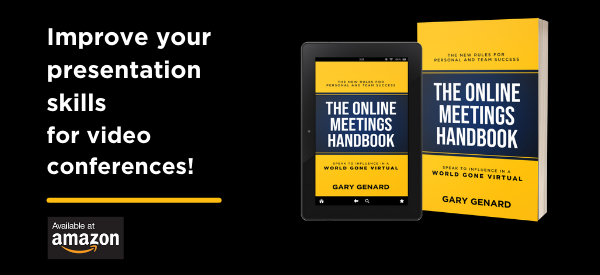
Do you sense that people stop listening when you present in person and virtually? Here's how to make sure people pay attention to you.
Is there anything better than feeling prepared about presenting information—and anything worse than realizing people have stopped paying attention?
There are two clues in that question about how to answer it, each depending upon a single word. I'll get to them in a minute. So, stay tuned, detectives.
Why not start out strong in the first place? Be on top of your game right away! Download my Free resource, "How to Introduce Yourself in a Professional Situation."
The first clue is staring us in the face. The truth is, in fact, that we usually have been staring at it for far too long.

Are You Data-Centered . . . or Audience-Centered?
My recent work with a client illustrated this problem of lack of audience attentiveness. The person's boss contacted The Genard Method about this valued employee. "I constantly have opportunities for him to present to high-level executives," she said; then added, "but although he's excellent when it comes to conveying information, people stop paying attention."
Learn the new rules for personal and team success when it comes to speaking virtually! Click on the image below for my NEW BOOK, The Online Meetings Handbook.
There's that word again—our first clue—information. When I began coaching this individual, I discovered something I had expected to be the case (old gumshoe that I am). In the run-up to his presentations, this executive focused exclusively on the data he'd be presenting.
Granted, the meetings at which he was speaking seemed to be all about data. Except they weren't. As in most meetings, the purpose was to foster understanding and initiate action of some kind. In preparing to present, the exec was making sure he had a strong relationship with his information. But he didn't have a similar relationship with his listeners; and he wasn't doing anything about it.
When we present, we need to carefully consider three things: a) who our audience is, including their needs and expectations, b) how we can speak to them in ways that connect with their world, and c) what we want to accomplish by the end of the speech. Think about this in terms of your own talks. If you're devoted to bringing some benefit to listeners, they will pay close attention to what you say. Why wouldn't they? You've made it clear this is all about them.
Does your equation hold up? The lesson here is, we have to prepare our talks with the audience at the center of our thinking. Spending 100% of our prep time making sure we get the data right is simply to leave the audience out of the equation.
Want to learn more about how to engage and motivate listeners? Download my Free Cheat Sheet, "5 Ways to Captivate an Audience."

Why Nonverbal and Vocal Skills Matter So Much
The explanation above is a cardinal principle of connecting with and positively influencing audiences. And principles are grand and noble things. But how do you make it happen?
That's where our second clue comes in. This time, the word in our initial question was "people." Specifically, how people respond to you—intellectually, yes, but especially emotionally.
A speaker can own the best information in the world but give people bruises on their foreheads from their heads hitting the table. We avoid that fate by first, doing what I advocate above by placing the audience at the center of your universe; and second, making your material come to life through your presentation persona.
More than anything else, that means effective nonverbal communication. And your most powerful tool here is your voice. It's true that we tend to obsess over body language. But no tool is as powerful, flexible, and persuasive as your voice.
Achieve the vocal dynamics that will make you a compelling speaker. Get my Free Guide, "5 Ways to Improve Your Voice as a Professional."
Audiences are hard-wired to make judgments about you based on how you speak to them. In fact, the meaning of what you say can change according to how you say the words. The list of attributes that listeners take away from your vocal performance is virtually endless. It includes warmth vs. coldness, empathy vs. indifference, power vs. inadequacy, confidence vs. fear, excitement vs. detachment, and on and on.
When you commit yourself by investing totally in what you say, your entire presentation will come to life. Blood will start pumping through its veins. How could anyone not pay attention?
You should follow me on Twitter here.
How's your virtual speaking? Click below to grab your copy of my NEW BOOK:
Gary Genard is an actor, author, and expert in public speaking training and overcoming speaking fear. His company, Boston-based The Genard Method offers live 1:1 Zoom executive coaching and corporate group training worldwide. In 2020 for the seventh consecutive year, Gary has been ranked by Global Gurus as One of The World's Top 30 Communication Professionals. He is the author of the Amazon Best-Seller How to Give a Speech. His second book, Fearless Speaking, was named in 2019 as "One of the 100 Best Confidence Books of All Time." His latest book is The Online Meetings Handbook, now available at The Genard Method and on Amazon. To know more about TGM's services, Contact Gary here.

%20cropped.png?width=400&name=DIY%20Book%20Designs%20Free%20Cover%20(2)%20cropped.png)


